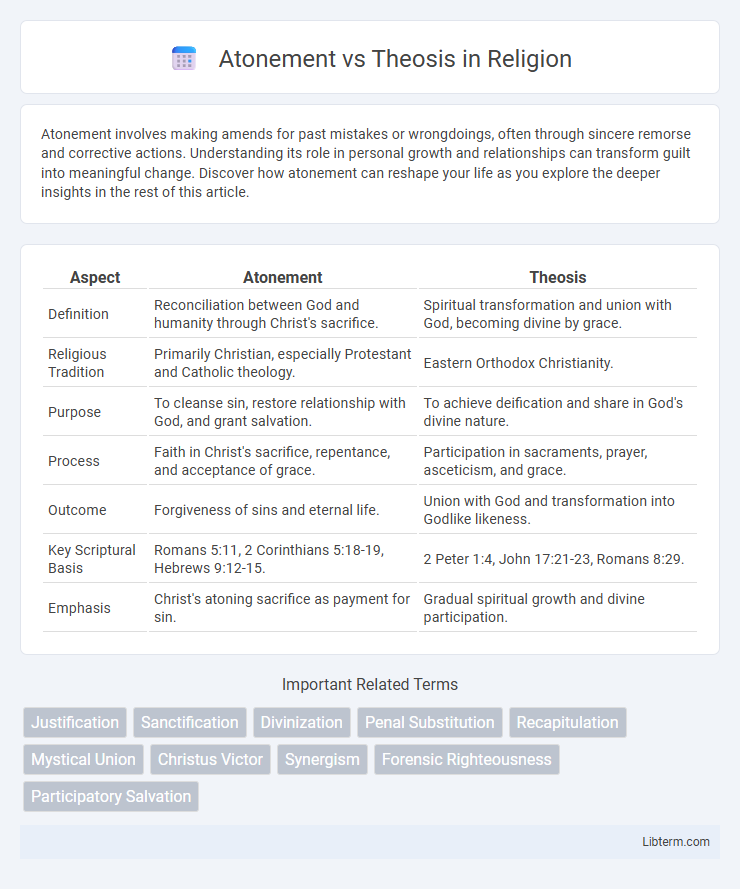Atonement involves making amends for past mistakes or wrongdoings, often through sincere remorse and corrective actions. Understanding its role in personal growth and relationships can transform guilt into meaningful change. Discover how atonement can reshape your life as you explore the deeper insights in the rest of this article.
Table of Comparison
| Aspect | Atonement | Theosis |
|---|---|---|
| Definition | Reconciliation between God and humanity through Christ's sacrifice. | Spiritual transformation and union with God, becoming divine by grace. |
| Religious Tradition | Primarily Christian, especially Protestant and Catholic theology. | Eastern Orthodox Christianity. |
| Purpose | To cleanse sin, restore relationship with God, and grant salvation. | To achieve deification and share in God's divine nature. |
| Process | Faith in Christ's sacrifice, repentance, and acceptance of grace. | Participation in sacraments, prayer, asceticism, and grace. |
| Outcome | Forgiveness of sins and eternal life. | Union with God and transformation into Godlike likeness. |
| Key Scriptural Basis | Romans 5:11, 2 Corinthians 5:18-19, Hebrews 9:12-15. | 2 Peter 1:4, John 17:21-23, Romans 8:29. |
| Emphasis | Christ's atoning sacrifice as payment for sin. | Gradual spiritual growth and divine participation. |
Understanding Atonement: Definitions and Origins
Atonement in Christian theology refers to the reconciliation between God and humanity, primarily achieved through the sacrificial death and resurrection of Jesus Christ, which addresses sin and restores spiritual harmony. The concept originates from Old Testament sacrificial practices and Jewish traditions, evolving through early Church teachings and councils to emphasize Christ's role as the mediator who expiates sin. Theosis, contrastingly, is rooted in Eastern Orthodox theology, highlighting the transformative process of humans becoming divine by grace, a concept complementing but distinct from the Western focus on legalistic atonement.
Theosis Explained: Historical and Theological Roots
Theosis, rooted in Eastern Orthodox theology, refers to the transformative process of becoming united with God and attaining divine likeness through grace and cooperation with the Holy Spirit. Historically traced to Church Fathers like St. Athanasius and St. Gregory Palamas, theosis emphasizes participation in the divine nature (2 Peter 1:4) as a dynamic spiritual journey rather than a legalistic reconciliation. This concept contrasts with Western models of atonement by framing salvation as deification and eternal communion with God rather than solely the forgiveness of sins.
Scriptural Foundations: Atonement vs Theosis
Scriptural foundations of atonement emphasize Christ's sacrificial death and resurrection as the means of humanity's reconciliation with God, highlighted in passages like Romans 5:10 and 2 Corinthians 5:18. Theosis, rooted in Orthodox theology, is supported by scriptures such as 2 Peter 1:4 and John 17:21, which describe believers becoming partakers of the divine nature and unity with God. Both concepts reveal distinct yet complementary biblical insights into salvation and transformation within the Christian faith.
Key Differences: Western and Eastern Christian Perspectives
Atonement in Western Christianity emphasizes the legal framework of sin and redemption through Christ's sacrifice, highlighting doctrines like penal substitution and satisfaction. Theosis in Eastern Christianity stresses the transformative process of becoming united with God's divine nature, focusing on deification through participation in divine life and grace. These perspectives reflect differing theological priorities: Western Christianity centers on justification and forgiveness, while Eastern Christianity prioritizes spiritual transformation and union with God.
Atonement: Models and Interpretations
Atonement in Christian theology primarily explores models such as substitutionary, moral influence, and Christus Victor, each interpreting Jesus's sacrifice as either paying the penalty for sin, inspiring moral transformation, or defeating evil powers. The substitutionary model emphasizes Christ's role as a vicarious redeemer who bears the punishment meant for humanity, rooted in the doctrine of penal substitution. Interpretations vary across denominations, with Protestant traditions often highlighting penal substitution while Orthodox theology leans toward Christus Victor and transformational aspects, reflecting diverse understandings of redemption and reconciliation.
Theosis: Pathways to Divine Union
Theosis: Pathways to Divine Union explores the transformative journey in Eastern Orthodox theology where humans partake in the divine nature, achieving spiritual union with God. Unlike Atonement, which emphasizes Christ's sacrifice for sin, Theosis stresses the ongoing process of sanctification and deification through grace, prayer, and sacramental life. This pathway highlights the restoration and elevation of human nature, enabling believers to reflect divine attributes and experience eternal communion with God.
Christ’s Role in Atonement and Theosis
Christ's role in atonement involves His sacrificial death and resurrection, which reconcile humanity with God by removing sin and restoring divine justice. In theosis, Christ functions as the divine exemplar and enabler, granting believers participation in the divine nature through grace and sanctification. Both doctrines emphasize Christ's mediatory work, but atonement centers on redemption, while theosis highlights transformation into divine likeness.
Salvation Reframed: Legal vs Transformative Approaches
Atonement emphasizes a legal framework of salvation where Christ's sacrifice satisfies divine justice, ensuring believers are declared righteous through faith. Theosis presents salvation as a transformative union with God, aiming for believers' divinization and spiritual growth into Christlikeness. These contrasting approaches highlight salvation as either forensic justification or dynamic deification within Christian theology.
Impact on Christian Life and Spirituality
Atonement emphasizes redemption through Christ's sacrificial death, fostering a sense of forgiveness and reconciliation that deeply influences Christian repentance and moral transformation. Theosis highlights the transformative process of becoming united with God, encouraging believers to pursue holiness and spiritual growth through divine grace. Together, these doctrines shape Christian spirituality by balancing the assurance of salvation with the ongoing journey of sanctification and divine union.
Contemporary Debates and Ecumenical Dialogue
Contemporary debates on Atonement versus Theosis center on reconciling Western legalistic interpretations with Eastern transformative spirituality to foster greater theological unity. Ecumenical dialogue emphasizes the complementary nature of Christ's redemptive work (Atonement) and the believer's deification process (Theosis) as dynamic dimensions of salvation. Scholars advocate integrative frameworks that bridge soteriological motifs across Catholic, Orthodox, and Protestant traditions to enrich mutual understanding and Christian doctrine.
Atonement Infographic

 libterm.com
libterm.com